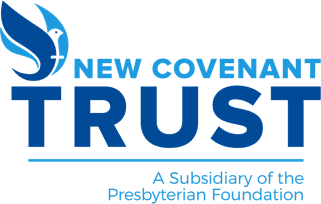
New Covenant Trust Company (NCTC) understands that for many churches, year-end giving is critical to your budget. Recent statistics on charitable giving show that 30% of annual gifts occur in the fourth quarter, with 20% being made in December alone. That’s why it’s essential to be prepared to both solicit and accept this influx of contributions.
We were pleased to partner with the Episcopal Church Foundation (ECF) to offer a webinar on how to make the most of your year-end giving efforts. Presenters were Jim Murphy, Director of Stewardship Resources and Operations at ECF, and Greg Rousos, President and CEO of NCTC, part of the Presbyterian Foundation. They shared some tips to enhance your congregation’s generosity during this season of giving. Below is a summary. To watch the recording, click here.
Transitioning from Cash Giving
Cash giving — putting paper money in the collection plate, writing a check or donating online via a credit card — has decreased dramatically in recent years, Rousos said. In fact, Yahoo News recently reported that 45% of Americans did not write a single check in 2022.
Not only that, but older generations, including Baby Boomers and The Silent Generation, have accumulated tremendous wealth. CNBC reported that those aged 52 to 70 had an average net worth of $1.2 million in 2019.
Churches are seeing an aging demographic in their pews, and Rousos urged church leaders to be prepared to participate in the tremendous generational wealth transfer that is already under way. He also noted that this wealth is not typically held in cash.
Cash is usually less than 10% of a family’s portfolio. The majority is “accumulated wealth,” which is held in real estate, stocks, retirement accounts, business interests and other appreciated assets.
Rousos cited the work of Texas Tech professor, Dr. Russell James, who found that while churches are very good at encouraging and receiving cash gifts, we are not adept at asking for and managing major gifts. That’s where NCTC and the church foundations can help. By transitioning from cash gifts to wealth-based giving, churches could see up to a sixfold increase in giving over a five-year period.
Gifts of Securities
Giving from appreciated assets is a much smarter way to give than cash, said Rousos, whether that’s stocks, mutual funds, real estate, exchange traded fund or other assets.
Securities gifts have a number of benefits for both donors and charities. Donors get some tax benefits, and charities receive larger gifts as a result.
For example, “I hold a stock that I bought for $1 that’s now worth $5,” said Rousos. “If I give that in kind — which means I gift that stock to a charity — I avoid the $4 capital gain, and I don’t have to pay tax on it. I also get the full value of that gift to claim as a charitable deduction.”
The challenge with these non-cash gifts is the time it takes to execute them. Unlike writing a check or making an online gift via credit card, which is instantaneous, Rousos advised that donors must plan ahead and initiate these gifts with their broker by mid-December in order for them to be effective by the end of the year.
Utilizing Donor-Advised Funds
A donor-advised fund is an ideal vehicle to make security gifts. Many church members already utilize these funds, so Rousos and Murphy encouraged churches to ensure they have policies and procedures in place to accept grants. Both church foundations can help.
Murphy gave an overview of how donor-advised funds work. “They empower donors in a new way,” he said. “They are really an opportunity of convenience and ease, where donors can make large, single gifts or gifts over the course of time, whatever fits their needs,” he said.
ECF works in collaboration with the Presbyterian Foundation and NCTC to provide donor-advised funds for a minimum contribution of only $2,500, issuing a minimum grant of $100. They can easily be established electronically, and include a mechanism to make recurring grants.
The donor retains the right to advise on where to invest the funds, and what charities to support, and then those grants are facilitated by the sponsoring charity.
Murphy shared that there has been an increase in not only the amount invested in donor-advised funds in recent years, but also a rise in the amount of grants distributed. “In fact, the payout from these funds is higher than from private foundations,” he said.
While grants from these funds cannot be used to satisfy obligatory pledges, such as those made to capital campaigns, they do enable more regular giving and automated electronic granting.
QCDs and IRAs
Rousos shared a unique, and possibly substantial giving opportunity made possible by recent legislation — using an individual retirement account (IRA) required minimum distribution (RMD) as a charitable donation.
The required minimum distribution age is now 73, which means you must start taking distributions at that time, whether you want the income or not. Many members of our congregations are retirement age or older and are taking RMDs.
Traditional IRA distributions are considered ordinary income and impact an individual’s adjusted gross income (AGI). An increase in AGI can affect Medicare costs, other taxes, and phase out other deductions. A great way to meet the RMD requirement and keep it out of ordinary income is to use it as a qualified charitable distribution and give it directly to a charity. QCDs have a maximum of $100,000 per person per year.
QCDs can be made at a younger age than RMDs— at age 70 ½ — and the SECURE Act 2.0 signed into law at the end of last year also allows individuals to use a QCD to fund a charitable gift annuity or a charitable remainder trust at a lifetime maximum of $50,000.
“The advantage to this is it takes what would be all ordinary income in one year and stretches it out over a number of years,” Rousos said. “It also gives you a charitable deduction. For many people that are 70 or older, this is absolutely the best way to give.”
Rousos advised churches to make sure they are set up to accept QCDs. Like securities, this process also takes time, so donors must make their election between Thanksgiving and the early December for it to take effect by the end of the year.
Planned Giving
Not only is this the season of giving, it is also the time of year when people are thinking about the most important things in their lives and their legacy. Murphy shared that the Episcopal and Presbyterian foundations have a number of resources available for church leaders to enhance their ongoing planned giving efforts, including some online tools.
Planned giving is future focused and legacy focused, he said. “When someone makes a planned gift, they raise the church they raise the institution to the level of family in their estate.”
Planned gifts can be mission-changing and life-changing for congregations. There are many different ways to for members to include their church in their estate plans. Murphy urged church leaders not to presume that their donors are already aware of their planned giving options. Education is key.
This can be as simple as ensuring there is information on your pledge card about planned giving. Murphy also suggested that acknowledgements of year-end gifts are great opportunities to encourage annual donors to consider making a planned gift, or share information about how to do so.
In addition to gifts of assets, trust or account designations, donors may choose to make life income gifts, he added. These are irrevocable gifts that offer a charitable deduction in the year they are made. Then either the donor or whomever the donor designates receives income for the rest of their life, with the remainder of that gift left to charity after they pass away.
Take Advantage of Giving Tuesday
We all know about Black Friday and Cyber Monday, but Giving Tuesday is a wonderful, easy opportunity to encourage year-end giving, Murphy said. He encouraged church leaders to send out a brief email appeal, or announcing it during the previous Sunday service.
He also advised churches to make sure you offer a clickable link to donate. Set a goal for the appeal, and perhaps a ministry focus. If you miss Giving Tuesday, encourage members to give throughout Advent, or in memory of a loved one.
NCTC, the Presbyterian Foundation and ECF want to help both donors and churches take advantage of smarter ways to give. The right gift vehicle and the right asset really matters to maximize the gift to your church. To learn more, please don’t hesitate to reach out to us at 800-858-6127, Option. 6.
